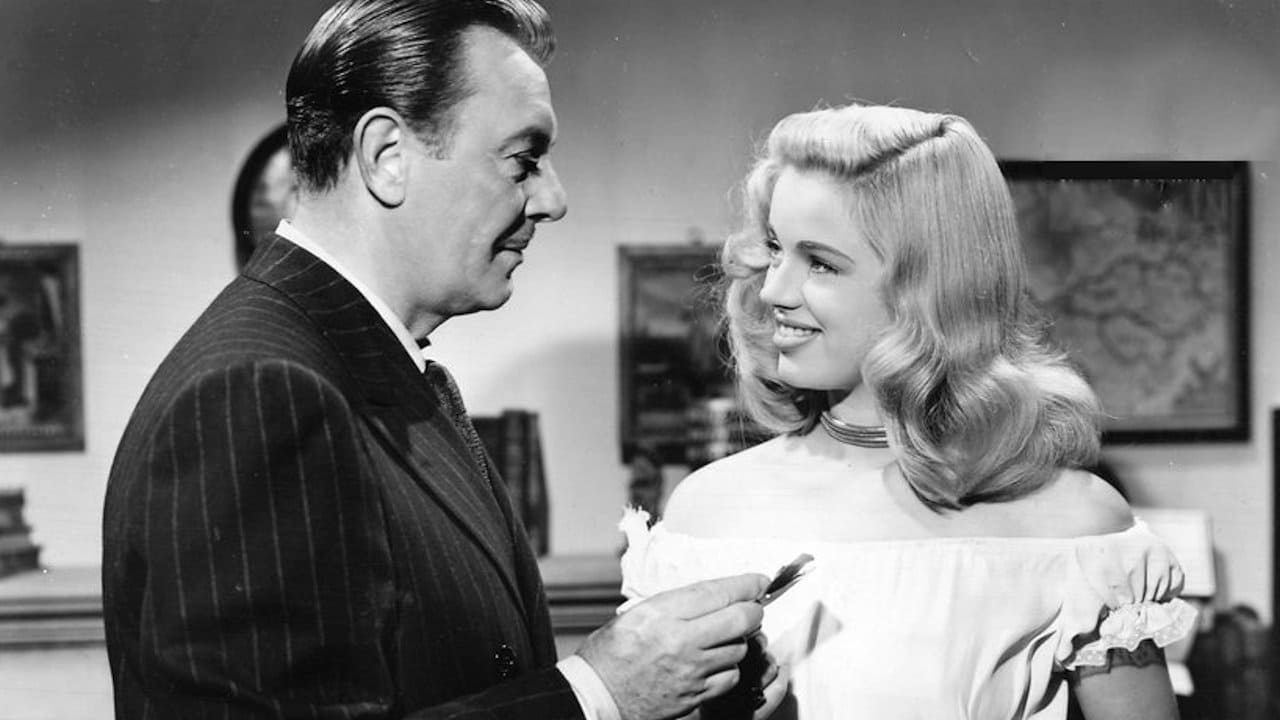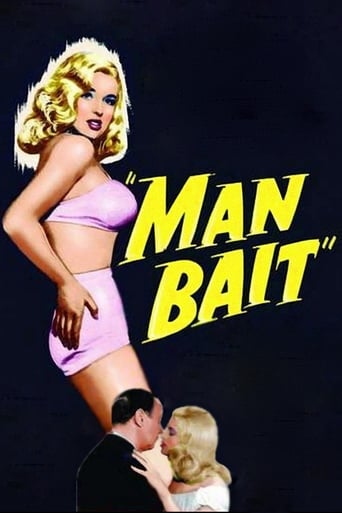

This Movie Can Only Be Described With One Word.
... View MoreSadly Over-hyped
... View MoreMost undeservingly overhyped movie of all time??
... View MoreExactly the movie you think it is, but not the movie you want it to be.
... View MoreA better than average drama written by Frederick Knott, the author of "Dial M for Murder" and "Wait Until Dark", this shows Terence Fisher expertly handling a story of crime, lust and death during his efficient early phase working for Hammer Films, five years before the big success of "The Curse of Frankenstein". Although the main character is John Harman, the mature manager of a London bookstore (played by Irish actor George Brent), two young actors play more appealing characters who are key components of the plot and feature: Diana Dors and Peter Reynolds. A ravishing blonde beauty at 20, Dors had had a dozen of minor screen roles before being introduced in this production as Ruby Bruce, a sexy worker who turns everything around her upside down after she gets mixed up with Jeff Hart, a seductive ex-con played by Reynolds. Under Jeff's influence Ruby blackmails Harman, next a couple of corpses complicate the proceedings, soon Harman is accused of murder and then his secretary (American actress Marguerite Chapman) helps to solve the mystery, putting her life in danger. Peter Reynolds is fine, but he does not have much to do as the villain with sinister charm. It is Diana Dors who has more room for creating a real character. She was a very good actress, and although comparisons were often made with Marilyn Monroe, on the acting level she surpassed her American colleague: here she convincingly mixes naive wickedness with vulnerability, making the film not only the account of Harman's story but the drama of a confused working girl as well.
... View MoreThe Last Page (AKA: Man Bait) is directed by Terence Fisher and adapted to screenplay by Frederick Knott from James Hadley Chase's story. It stars George Brent, Marguerite Chapman, Raymond Huntley, Peter Reynolds and Diana Dors. Music is by Frank Spencer and cinematography by Walter J. Harvey.John Harman (Brent) is a London bookshop manager who finds himself blackmailed by his busty young assistant, Ruby Bruce (Dors), and her new ex-convict beau Jeffrey Hart (Reynolds), when he foolishly steals in for a kiss during after hours stock taking.Bookshop Noir.British Hammer and American Exclusive teamed up to produce a number of low budget crime dramas in the early 1950s, often using American stars and directors blended in with British actors, they were produced in Britain in next to no time. The Last Page is a safe viewing for the undemanding film noir fan. Terence Fisher would become a legend amongst British horror fans (rightly so) for his work on Hammer's reinvention of the Universal Creature Features. Here he crafts a nifty atmospheric melodrama without fuss or filler, while just about managing to stop the flaws and daftness of plotting from sinking the picture.Story has some interesting noirish characters and themes. The man who begins to pay for a moment of weakness, the young shapely gal in over her head-lured to the dark half by a well spoken criminal element, while some secret passions amongst the staff of this particular bookstore come to the fore once things inevitably go pear shaped. The setting is a doozy as well, this bookstore is perfectly antiquated, so much so you can smell the leather bound novels nestling on the shelves. Walter Harvey's (The Quatermass Experiment) photography ensures that shadows feature throughout, and there's the odd macabre touch that befits the writing of Frederick Knott (Dial M for Murder/Wait Until Dark).Cast are professional to the last. Brent (The Spiral Staircase) and Huntley (I See a Dark Stranger/Night Train to Munich) are the epitome of gentlemen in a rut, stoic and stiff, grumpy yet gritty, but nicely portraying men we expect to appear in a bookstore noir. Chapman (Coroner Creek) has an abundance of hard looking sexuality and Reynolds has a spiv nastiness about him, very cold but charming. But it's Dors who holds all the aces, she would impress herself upon many a red blooded male during three decades of British film and TV. Here at aged 21, as Ruby, she's a curvy blonde babe with full lips, a gal who understandably turns the heads. The character is tardy as well, hardly a crime, but mostly in Dors' hands she's believable as a girl clearly out of her depth, she's not a femme fatale, she's a weak willed person hurtling towards film noir doom. It's here where this British B noir gets its worth.It's not a great film by any stretch of the imagination, but it is a good one considering the modest budget afforded it. There's dumb decisions made by characters, holes of plotting and the ending fails to seal the deal after the hard noirish mood eked out by Fisher, Harvey and Dors. However, as film noir time fillers go, it's well worth checking out. 6.5/10
... View MoreIn 1950, before Hammer made a name for itself with a memorable horror output, it set up a deal with American producer Robert L. Lippert to make a dozen or so low budget crime dramas, all of which were to be shot in the UK. In all the arrangement lasted for some five years, and utilised the fading star qualities of such past-their-sell-date American talent such as Dane Clark, Paul Henreid, Lizabeth Scott and George Brent, as well as leading British character actors.None of the films are of the front rank, being issued originally on the bottom half of double bills. Hammer may not have established itself as a memorable producer of noir on the basis of this transatlantic deal, but the results have been unfairly neglected (being the basis of only a passing reference in the official history of the studio for instance).Criticism of the films, apart from focusing on their small budgets and hand-me-down leads, has generally dwelt on the success or otherwise of transplanting an American hardboiled genre into a different soil. Certainly the first of those made under the new arrangement The Last Page (aka: Man Bait, 1952) is example. Far too genteel to be successful as more than a mildly suspenseful thriller, its impact is further affected by the unassuming performance of lead George Brent - an actor whom Betty Davies apparently liked as a partner on screen as it was so easy to steal the picture from him! Brent plays the manager of a bookshop, hardly the first choice for a thriller/ noir setting (although one makes a memorable appearance in The Big Sleep) who is blackmailed by the bad blonde of the title - no less than Diana Dors, an early screen role. It was an early credit too for one of Hammer's best directors Terence Fisher, though again this critic, at least, thinks he remains a minor talent. Like practically all the Hammer films in this series, the title was changed for the American market and 'Man Bait' certainly sounds more the job for the pulp world that the films inhabit. It also places Dors firmly at the centre of this film with a fine sense of atmosphere - having worked in the book trade for some years I found the dated interiors and procedures especially fascinating - while some other, equally effective location shooting amidst a now-lost London adds to the charm.
... View MoreI'm a big Terence Fisher fan, so as a completist, I wanted to see this one. But it's only a fair film. Fisher was a few years away from making his classic CURSE OF FRANKENSTEIN and HORROR OF Dracula, but he was still capable of some fine work in the early 50's (THE FOUR-SIDED TRIANGLE, for example). But this one is pretty much by-the-numbers. Even leading man George Brent looks bored throughout. He runs a bookstore where employee Marguerite Chapman is in love with him. And good-looking Diana Dors is the 'bad' employee -- because she's late a few times. Brent has an invalid wife who needs an operation abroad. He cashes in an insurance policy to pay for the operation. Meanwhile, Dors has caught weaselly Peter Reynolds trying to steal a book but doesn't turn him in. They strike up a relationship. He gets her to try to blackmail Brent after a late night when he kissed her briefly (tho' it looks more like she kissed him). He won't pay, so Reynolds has Dors write a letter to the invalid wife. She dies after reading the letter (in one of a string of incredible plot coincidences). Reynolds makes Dors harass the grieving Brent again for the money. He angrily gives her all the insurance money. Then Reynolds sneaks into the bookstore and kills Dors, taking the dough, but leaving the body so that Brent will be blamed. Brent's soon on the run and Chapman is trying to save him. It all works out in a fiery climax. And it's all competently done, but the script doesn't make a lot of sense. Dors, however, gives a fine, restrained performance and is probably the best thing in it. Worth noting that later Hammer Producer/Director/Exec Michael Carreras is here credited with Casting. And Hammer Writer Extraordinaire Jimmy Sangster is credited as Assistant Director. Really this is just for Hammer and Fisher fans like myself. Or Diana Dors fans, who will be pleased with her work here.
... View More